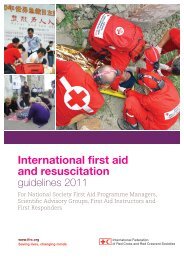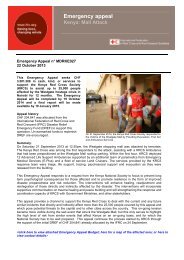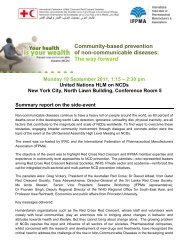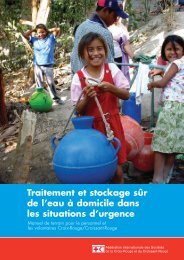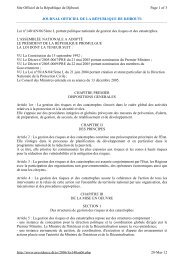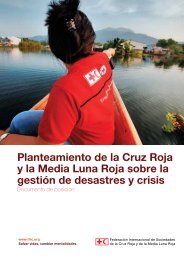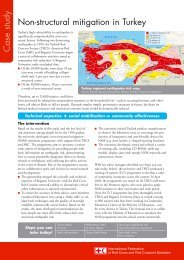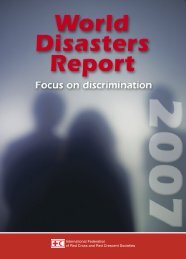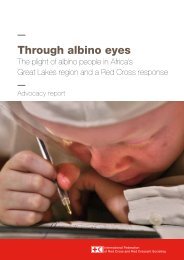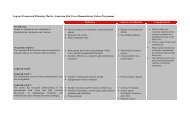World Disasters Report 2010 - International Federation of Red Cross ...
World Disasters Report 2010 - International Federation of Red Cross ...
World Disasters Report 2010 - International Federation of Red Cross ...
You also want an ePaper? Increase the reach of your titles
YUMPU automatically turns print PDFs into web optimized ePapers that Google loves.
Box 6.1 Key organizations and concepts in climate change<br />
The growing policy focus on climate change<br />
has led to the development <strong>of</strong> new institutions<br />
and the use <strong>of</strong> new terminology, some <strong>of</strong> which<br />
differs from that used in disaster risk reduction.<br />
The Intergovernmental Panel on<br />
Climate Change (IPCC) is the global scientific<br />
body established by the United Nations<br />
Environment Programme and the <strong>World</strong><br />
Meteorological Organization (WMO). It produces<br />
Assessment <strong>Report</strong>s (most recently, the<br />
Fourth Assessment <strong>Report</strong> in 2007) that summarize<br />
the state <strong>of</strong> knowledge on climate change<br />
and its potential consequences. Its preparation<br />
for the Fifth Assessment <strong>Report</strong> acknowledges a<br />
need for greater attention to adapting cities to<br />
climate change and incorporating knowledge<br />
and experience on disaster risk reduction.<br />
The United Nations Framework Convention<br />
on Climate Change (UNFCCC)<br />
provides the global legislative framework<br />
for reducing global warming and responding<br />
to climate change and convenes the annual<br />
meeting for negotiating emissions reductions<br />
and adaptation financing known as the<br />
Conference <strong>of</strong> Parties, or COP (e.g., COP15 in<br />
Copenhagen, held in December 2009).<br />
116<br />
Changing patterns <strong>of</strong> risk :<br />
The effects <strong>of</strong> climate change<br />
Greenhouse gases are gases that<br />
ab sorb and emit radiation <strong>of</strong> specific wavelengths,<br />
leading to the trapping <strong>of</strong> heat in the<br />
earth’s atmosphere, a process known as the<br />
greenhouse effect. Although the process<br />
occurs naturally and is important in supporting<br />
life on earth, the emission <strong>of</strong> carbon dioxide,<br />
nitrous oxide, methane and other gases as a<br />
result <strong>of</strong> human activity has raised the concentration<br />
<strong>of</strong> these gases sufficiently to result in<br />
anthropogenic climate change.<br />
Adaptation is an adjustment in natural<br />
or human systems in response to actual or<br />
expected climate change in order to reduce<br />
its harmful impacts. It may take place before<br />
the impacts are felt, may be planned through<br />
deliberate policies, or may be spontaneous.<br />
It can involve individuals, communities, local<br />
governments and nation states.<br />
In the climate change arena, mitigation<br />
refers to a reduction in atmospheric greenhouse<br />
gases, thereby limiting the extent <strong>of</strong> anthropogenic<br />
climate change. It involves both reducing<br />
the quantities <strong>of</strong> emissions and enhancing the<br />
ability <strong>of</strong> natural and human systems to absorb<br />
greenhouse gases. �<br />
Although the earth’s climate has always been dynamic, over the last 100 years global<br />
temperatures have been rising largely as a result <strong>of</strong> human activities, a process known as<br />
anthropogenic climate change. This has been driven by the production <strong>of</strong> greenhouse<br />
gases – and their increasing concentration in the atmosphere – since the industrial<br />
revolution. Observed changes include an increase in the global average temperature <strong>of</strong><br />
0.740 degrees Celsius, increased ocean temperature and acidity, a decline in snow coverage<br />
in the northern hemisphere, more frequent and intense extreme weather events,<br />
shifts in the distribution <strong>of</strong> animal and plant species, and a rise in global average sea<br />
levels <strong>of</strong> 17 centimetres. The IPCC’s Fourth Assessment <strong>Report</strong> concluded that likely<br />
future changes in climate include warmer and fewer cold days and nights, warmer and



